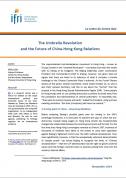The Umbrella Revolution and the Future of China-Hong Kong Relations

In this article, Willy Lam argues that the events of recent weeks represent a turning point in China-Hong Kong relations. The author analyses the multiple facets of the movement in Hong Kong and Beijing's response.
The unprecedented civil-disobedience movement in Hong Kong – known as Occupy Central or the “Umbrella Revolution” – has lasted more than five weeks with no inkling of an endgame. The Beijing leadership under conservative President and Commander-in-Chief Xi Jinping, however, has given clear-cut signals that there are limits to its tolerance of what it considers a frontal challenge to the Chinese Communist Party’s authority.
This is a modified version of an article that originally appeared in the China Brief of the Jamestown Foundation (23 October 2014).
Download the full analysis
This page contains only a summary of our work. If you would like to have access to all the information from our research on the subject, you can download the full version in PDF format.
The Umbrella Revolution and the Future of China-Hong Kong Relations
Related centers and programs
Discover our other research centers and programsFind out more
Discover all our analysesJapan’s Takaichi Landslide: A New Face of Power
Prime Minister Sanae Takaichi has turned her exceptional popularity into a historic political victory. The snap elections of February 8 delivered an overwhelming majority for the Liberal Democratic Party (LDP), driven by strong support from young voters, drawn to her iconoclastic and dynamic image, and from conservative voters reassured by her vision of national assertiveness. This popularity lays the foundation for an ambitious strategy on both the domestic and international fronts.
The U.S. Policy Toward Taiwan Beyond Donald Trump: Mapping the American Stakeholders of U.S.-Taiwan Relations
Donald Trump’s return to the White House reintroduced acute uncertainty into the security commitment of the United States (U.S.) to Taiwan. Unlike President Joe Biden, who repeatedly stated the determination to defend Taiwan, President Trump refrains from commenting on the hypothetical U.S. response in the context of a cross-Strait crisis.

China’s Strategy Toward Pacific Island countries: Countering Taiwan and Western Influence
Over the past decade, China has deployed a diplomatic strategy toward the Pacific Island Countries (PICs). This strategy pursues two main objectives: countering Taiwan's diplomatic influence in the region and countering the influence of liberal democracies in what Beijing refers to as the "Global South."

Opening up the G7 to South Korea to Address Contemporary Global Challenges
The G7’s global influence has diminished as powers like China reshape international governance through initiatives such as BRICS and the Shanghai Cooperation Organisation (SCO). With the G7 now representing just 10 per cent of the world’s population and 28 per cent of global GDP, its relevance is increasingly questioned.









